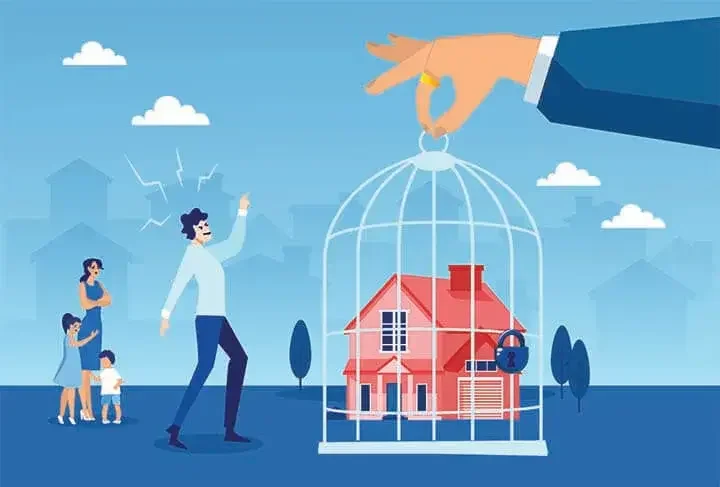During the COVID-19 pandemic, many people will have lost their jobs, filed for unemployment, or won't get unemployment, depending on the type of job. This directly affects tenants' ability to pay the rent to their landlord and their rights to stay in their apartment during the pandemic.

Some states are helping tenants by declaring a moratorium on evictions, while others haven't addressed this issue at all. Know where to turn and what to do is crucial for keeping you in your home and for getting you through this time.
How eviction moratoriums apply to tenants
Tenants need to check with their city government or with a landlord-tenant attorney to find out what applies in your area. For example, California declared a moratorium on most evictions during the coronavirus crisis, but this doesn't apply to every single situation.
First, as a tenant in California, you must notify your landlord in writing before or after your rent is due that you lost your job, either permanently or temporarily, due to COVID-19 and that you can't pay your rent. In most cities in California, you can't be evicted during this time, nor can the landlord raise the rent, but these laws change daily.
Some cities require you, as the tenant, to inform the landlord in writing within 30 days that you can't pay rent, and you must mention that you can't pay because of COVID-19. Other cities require as little as 7-days' notice that you can't pay rent. Check with your city clerk or with an attorney to find out how much time you have and what the procedures involve.
In the meantime, in most places in California, you can't be evicted during the pandemic, nor can you be evicted in New York or Washington. Some states apply the eviction moratorium to mortgages and rentals, while others apply it only to the payment of the mortgage, and some apply it only to payment of rent.
Because everything is state-specific and even city-specific, you must check with your city clerk or with an attorney to see what applies in your area. Some of the states, such as Indiana, intend to lift the moratorium as soon as the pandemic is over. Other states, such as Wisconsin, have a specific date when the moratorium ends, although you can expect to see some of these dates extended.
Rent after the emergency
In most cases, rent won't be forgiven, but you may have time to pay your rent arrears, depending on your state. Some cities in California allow up to 12 months to repay rent, while other cities allow only 3 to 6 months to get caught up. Keep up-to-date by checking with your city, state, or attorney to find out how much time you have to repay rent.
In the meantime, in states and cities that imposed a moratorium, you can't be evicted for nonpayment of rent, but make sure you communicate to the landlord that you've either been terminated from your job or that you have COVID-19. In California, timely notification, depending on the city, will likely stop most evictions during the pandemic, but that doesn't mean you won't get an eviction notice. That also doesn't mean you must vacate the premises, although the landlord hopes you will.
Limitations for landlords
A landlord cannot shut off any utilities, lock you out, remove the door hinges, shut off heat or water, or deprive you of your usual services during the pandemic. That's illegal.
If you can negotiate a payment plan with the landlord, get legal assistance if you can. If your lease ends during the pandemic, try negotiating a month-to-month lease with the landlord, but keep in mind that in some areas, a landlord can raise the rent for a new month-to-month lease even during the pandemic.
There are horror stories about the pandemic itself, but in addition, some tenants, not knowing their rights, have left their apartments upon a landlord's insistence that they move out. Other tenants have landlords who are sexually harassing them, demanding sexual favors in lieu of rent, or using other methods of harassment to collect rent. It's crucial for you, as a tenant, to know your rights and to assert them. You can try bargaining with your landlord so they can use your security deposit to pay part of your rent.
If you've been sexually harassed by your landlord, you can file a complaint with the United States Department of Justice.
Other protections for tenants
If you have federally funded housing, under the CARES Act adopted on March 27, 2020, you have until July 25, 2020, during which time you can't be evicted, charged with late fees or penalties, or forced out of your apartment. There's a time after this period expires when you can receive a 30-day notice to vacate. The Act, however, still doesn't relieve you of paying arrears.
Under the CARES Act, you're also protected by the Department of Housing and Urban Development (HUD), by the Housing Act voucher program, by the Violence Against Women Act, or the CARES Act assistance program. An experienced landlord-tenant attorney can help you apply for these programs.
How eviction moratoriums apply to landlords
It's understandable that this is a tough time for landlords too, because they have bills to pay, and they must repair apartments if there are habitability issues, even if the tenant isn't paying. Still, you can understand that states are trying to protect people from becoming homeless in the middle of a pandemic.
Landlords who've removed tenants contrary to their state or city laws during moratoriums risk having steep fines imposed, or court actions filed against them. Evictions must occur properly, or landlords will feel the consequences.
Also, when the emergency passes, the United States could face a housing emergency if landlords participate in mass evictions. Most courts won't allow that to happen, so if you, as the landlord, can negotiate with your tenants to pay their arrears, try to do so.
That doesn't mean you can't evict some tenants later on, but a court will know if you're trying to evict an entire building. Work with your tenants as best you can during the pandemic, use security deposits if you must, and try to arrange payment plans if possible.
This is a trying time for everyone, but if landlords and tenants follow the laws in their cities and towns, you might work things out, so you're both made whole after the emergency ends.

